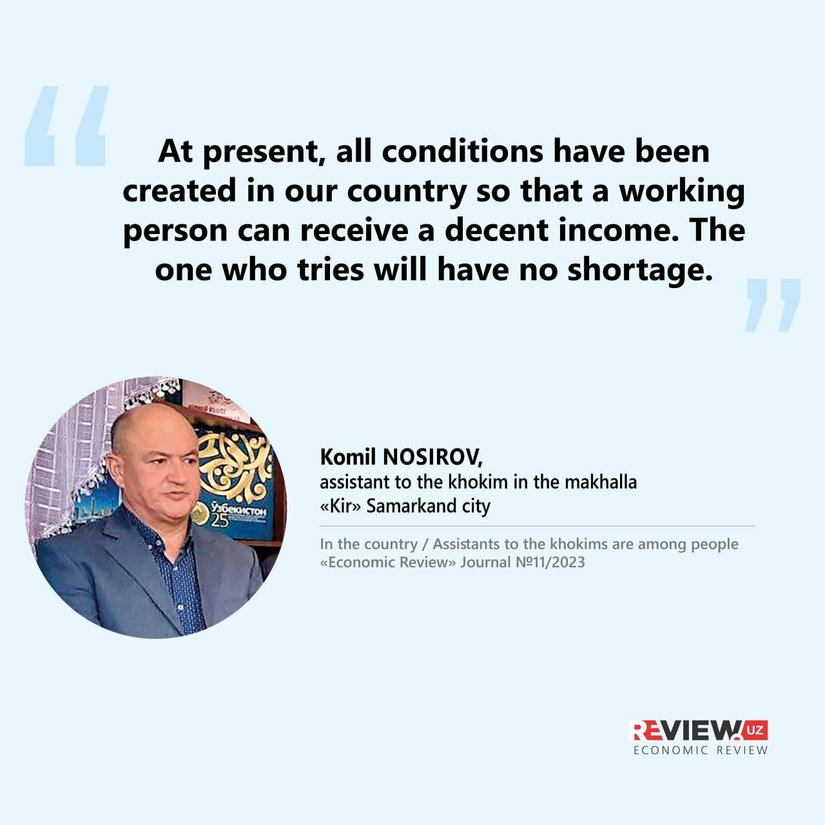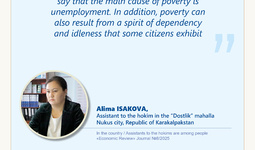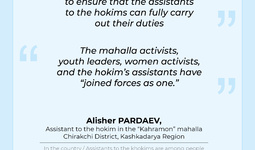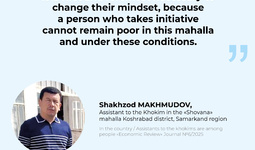— In our country, the "makhallabay" system was introduced for the first time. What is the nature of this position for you, how do you see and understand it?
— The makhallabay work system and the position of assistant to the khokim, introduced at the initiative of the Head of state, have become a big step towards the socio-economic development of makhallas, as well as providing employment, increasing income, providing ample opportunities for entrepreneurship, thereby reducing poverty.
In short, the assistant to the khokim is engaged in the implementation of reforms carried out in our country at the makhalla level, as well as solving the problems of the population directly on the ground. I am glad to contribute to the work within this responsible system.
— Tell us more about yourself and how you came to this position. How familiar were you with the work of the makhalla before, where you are now an assistant to the khokim? What is your past work experience that allows you to solve the tasks assigned?
— I was born and raised in the city of Samarkand. I spent my youth here. I have a higher education. The main part of my career has been spent in various positions in the internal affairs agencies. Before I moved to the position of assistant to the khokim, I worked as the chairman of the same makhalla. That is why I was intimately familiar with the daily life and concerns of the population, and it was very useful to me in my work.
— Tell us in detail about your makhalla. Where is it located, in the village or in the city, what is its size? What large enterprises are there for the work of the residents of makhalla, what types of activities are local people engaged in? What kind of social infrastructure facilities are there in the makhalla (school, kindergarten, medical center, etc.)?
— Kir is one of the ancient makhallas of the city, in 2012 it became part of the city of Samarkand. The makhalla consists mainly of private houses, but there are also apartment buildings. There are 523 apartments in total. Our territory is large, there are many manufacturing enterprises. The population is mainly engaged in trade and production.
There are three leading business entities. This is a joint venture between SAM ANTEP GILAM, Bionur Medservice Clinic and Samarkand Afrosiab Parranda company. There are more than 60 enterprises producing granite and paving slabs on the territory of the makhalla. The world-famous Ulugbek Observatory, as well as a large market for the sale of car parts, are also located on the territory of our makhalla, which creates great opportunities for entrepreneurship. For example, many households bake and sell the famous Samarkand bread.
— Which social groups make up the majority in the region, how many poor and low-income people need support? Is it possible to show the "social portrait" of your makhalla in numbers?
— Most of the residents of the makhalla are people who were born and raised here. Based on this, many residents of the makhalla are engaged in permanent work or some kind of business. In turn, it is worth noting that there are almost no poor families who depend on someone. Initially, 23 people were included in the list of those living in the makhalla and in need of help. As a result of systematic work, today all of them are employed on a permanent basis. If necessary, they were trained in new professions in demand on the market. There are no unemployed people in the mahalla today. There are also citizens working in other countries among the residents of the makhalla. We are in constant contact with them and involve them in the improvement of the makhalla.
— How did you develop relations with the residents of the makhalla, was it not difficult to get to know them better?
— Practical experience helped me a lot in this. Since I live here myself, I know everyone well. Therefore, there were no difficulties in this matter. From the first day of my activity, we worked as a team together with the chairman of the makhalla, a youth leader, a women's activist and a prevention inspector. In the morning, 7 makhalla officials get together and agree on daily tasks. That is, we are working in concert. This also has a positive effect on work efficiency. Residents can also report their concerns to officials via Telegram.
— As a result of the conducted research and studies, what are the main causes of poverty among the residents of the makhalla? What approaches have you developed to overcome them and solve the existing problems?
— Based on my experience, I can say one thing with confidence. At present, all conditions have been created in our country so that a working person can receive a decent income. The one who tries will have no shortage. For example, even cooking ordinary bread, you can get enough income to feed your family. I myself helped several citizens to set up baking activities. They were also allocated places in shopping stalls.
— For the sustainable development of the makhalla, the availability and condition of transport, energy, communal, social and other infrastructures are important. What kind of work is being carried out in this regard?
— Since our makhalla is a part of Samarkand, there are no problems with the infrastructure here, since the residents of the region are fully provided with electricity, natural gas and clean drinking water. As a result of our long-term efforts, all roads in the makhalla, even the internal ones, were paved by 100%. In addition, the courtyard houses on the territory of the makhalla were also connected to a centralized sewerage system. Night lighting was installed on the streets of the makhalla, and the outdated building of the medical center was repaired.
In order to prevent crime on our streets, with the support of entrepreneurs living in the makhalla, 30 surveillance cameras were installed. Rustam Murodov, an entrepreneur from the makhalla, rebuilt and landscaped 5 houses in the makhalla.
Now it's time to create the necessary conditions for residents and young people to spend their free time usefully. For example, we recently opened boxing and volleyball sports schools for makhalla children. We have also organized training courses on car repair for citizens who want to learn a new profession based on public-private partnership. Young people from the neighboring makhalla can also learn a new profession here.
— At present in our country there is a fierce struggle against all forms of corruption. What do you do in your business to prevent cases of corruption?
— In order to prevent corruption in our activities, we try to organize our work based on the principles of transparency and openness. In this, I rely primarily on the activists of the makhalla and the residents. A report on each work done is presented to the public, deputies and representatives of responsible local authorities. We do everything in coordination and in consultation with local residents. It also means a lot.
— What has changed in the makhalla during your activity, how do the residents feel about it? Has their trust in the institute of khokim assistants and the makhallabay system as a whole increased?
— Of course, as the standard of living of the people increases, the improvement of the makhalla, the welfare of the people, the trust of citizens in the state and its reforms also grows. The residents of our makhalla are employed here, they almost never go to other places to work. A lot depends on this too. Everyone is busy with their work. People are happy with their lives.
It is safe to say that the introduction of the position of assistant to the khokim has made a significant contribution to the comprehensive development of the makhalla, improving the standard of living of the population, increasing its income. But we still have a lot to work on. The main goal is the satisfaction of the people and to receive their blessing! May a good name remain after us!
Jamoliddin Turdimov
"Economic Review" Journal №11/2023





















leave a comment